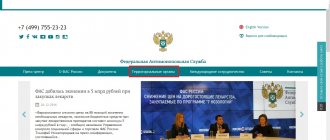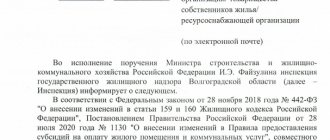General information about the ban
The law does not consider the concept of “ban on traveling abroad” - such an approach would be contrary to constitutional principles. To prevent this from happening, the legislation introduced the concept of “temporary restriction on departure” - a preventive measure, thanks to which a person, due to certain circumstances, does not have the right to leave the territory of the Russian Federation. Such a limitation is not a measure of liability; its essence differs depending on the area of application. For example, in enforcement proceedings, a restriction is a measure of compulsory execution, and in relation to the military we are talking about the characteristics of the service.
A citizen of the Russian Federation may be limited in the right to leave the Russian Federation in accordance with Art. 15 Federal Law No. 114 of August 15, 1996 “On the procedure for entry/exit from the Russian Federation” (hereinafter referred to as Federal Law No. 114). However, this is only the basis; there are other documents regulating this issue:
- Code of Criminal Procedure.
- Federal Law No. 229 of October 2, 2007 “On Enforcement Proceedings” (hereinafter referred to as Federal Law No. 229).
- ZRF No. 5485-1 dated July 21, 1993 “On state secrets.”
- Federal Law No. 53 of March 28, 1998 “On military duty.”
- Order of the Ministry of Internal Affairs, Ministry of Foreign Affairs, FSB No. 3663/135/110 of March 15. 2021 and other regulatory legal acts (LLA).
Reasons why they may not be allowed to go abroad
An exhaustive list of grounds for restrictions is presented in Art. 15 Federal Law No. 114. So, travel abroad can be prohibited in the following cases:
- access to information containing state secrets;
- conscription into the military or entry into alternative service;
- bringing to criminal responsibility as a suspect or accused;
- a court pronouncement of a guilty verdict against a person;
- evasion of fulfillment of financial or other obligations imposed on a citizen by a court within the framework of enforcement proceedings;
- providing migration authorities with false information when applying for a foreign passport;
- employment in state security agencies (FSB);
- declaring a citizen or individual entrepreneur bankrupt.
In accordance with Art. 16 Federal Law No. 114, if travel or departure abroad is restricted for a citizen, he receives a corresponding notification indicating the grounds for such a restriction, the timing of its application, details of the resolution on the basis of which it was adopted, as well as the body responsible for making such a decision. However, even if the notification is not received, the prohibition will still apply - confirmation of its receipt is not required.
The most common reason for restrictions on traveling abroad is debt, so let’s look at it in more detail.
What kind of debts are they not allowed to leave the Russian Federation with?
One of the grounds for sanctions is failure to fulfill the obligations imposed by the court, including those of a financial nature. Simply put, they may not be allowed to leave the country because of debts.
However, the very fact of having a debt does not limit the debtor’s right to leave; for this, enforcement proceedings must be opened.
An important point in this context is the amount of debt. According to Art. 67 Federal Law No. 229 will not be released from the country if you are in debt:
- more than 10 thousand rubles - if we are talking about the collection of alimony, compensation for property or moral damage caused as a result of the commission of a crime, for harm caused to health or associated with the death of the breadwinner;
- more than 30 thousand rubles - for any other requirements (fines, taxes, overdue loans);
- more than 10 thousand rubles - regardless of the nature of the debt, if more than 2 months have passed since the expiration date of voluntary execution (5 days from the date of receipt of the decision to open enforcement proceedings).
In addition, restrictions are imposed on non-property claims.
Court decisions
We challenged the arbitration manager’s refusal to include 8.5 million rubles in the register of creditors’ claims
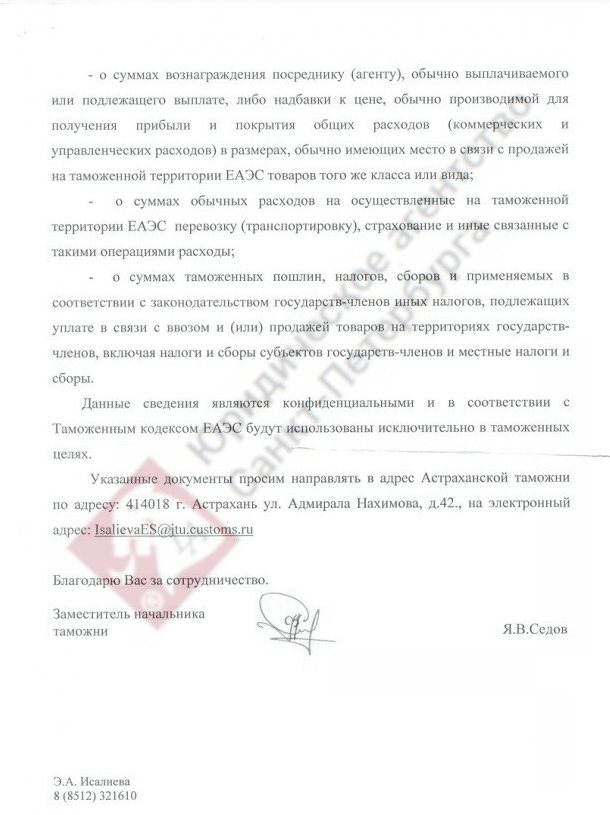
Between two fires: how to evade a customs request
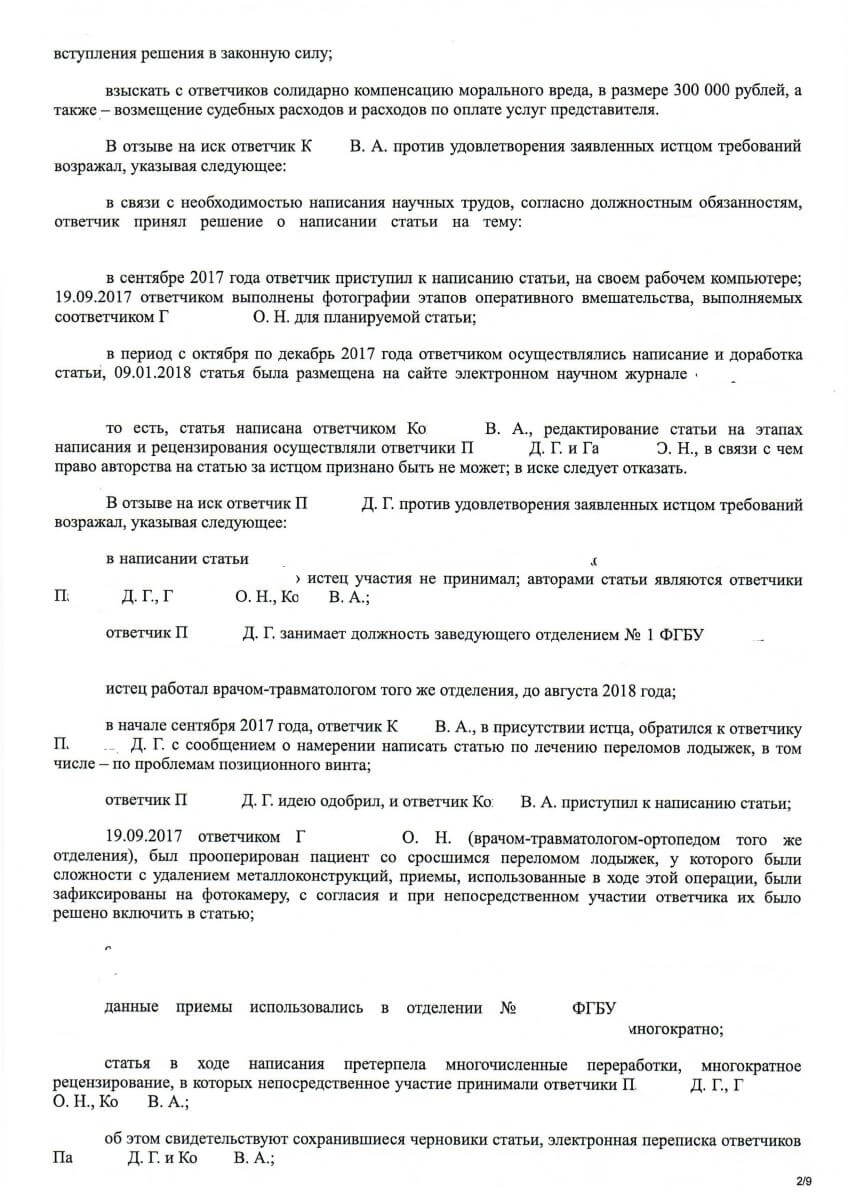
Restoring authorship of a doctor for an invention and a unique method of performing an operation

My housing: what to do if they try to kick you out of your apartment
The term was reduced by 6 times: defense of the accused under Article 228.1 of the Criminal Code of the Russian Federation

Intellectual Law: Protection of Copyright Works
Is it possible to travel abroad with a criminal record?
Another reason for not leaving the Russian Federation is criminal prosecution. The reason for the ban may be the announcement of suspicion, the preparation of an indictment and, accordingly, the acquisition of the status of an accused, or the issuance of a guilty verdict by a court and the acquisition of the status of a convicted person. All these procedural statuses are mistakenly combined by citizens into one concept - criminal record. They say that Russians with a criminal record are not given permission to travel abroad. This is a wrong point of view.
The point is that Art. 15 Federal Law No. 114 clearly establishes the limits of this restriction. Thus, in relation to suspects/accused persons, the ban is relevant until the court verdict comes into force, and for convicted persons - until the completion of the punishment or release from it.
However, a criminal record continues to be valid after serving the sentence - until it is expunged. The term depends on the severity of the penalty applied.
Procedure for applying a travel ban by bailiffs
As already noted, the mere presence of debts does not become a basis for a ban on leaving the country. To do this, a court decision must be made, enforcement proceedings must be opened, and only in case of evasion of debt payment, a restriction is imposed within its framework. The procedure for applying the ban on traveling abroad by bailiffs is determined by Art. 67 Federal Law No. 229. According to the law, the decision to apply a restriction to a specific debtor is made by the bailiff on his own initiative or on the initiative of the claimant. In general cases, when the amount of debt is above 30 thousand rubles, this can be done within 5 days after the debtor received a resolution to open enforcement proceedings.
If the debt did not arise on the basis of a judicial act (for example, according to a notarial inscription, arrears issued by the Federal Tax Service, etc.), according to clause 3 of Art. 67 Federal Law No. 229, the bailiff does not have the right to independently make a decision on restricting travel - to do this, he must go to court. Thus, the answer to the question whether they can not be released abroad without a court decision will be negative. A court decision is mandatory - to collect the debt or restrict travel.
Taking into account the above, the procedure for applying the measure we are considering is as follows:
- The claimant sends a request for restriction to the bailiff service.
- The bailiff considers the application, makes a decision on the restriction and issues a resolution on restricting travel outside the Russian Federation.
- No later than the next day after the decision is issued, the bailiff registers it in the Automated Information System of the FSSP in accordance with clause 3 of the Procedure approved by Order of the Ministry of Justice No. 187 of September 29, 2017. Then, through the electronic interaction system, the document enters the migration registration system used by border guards.
- The debtor becomes restricted from traveling abroad. When trying to cross the border in accordance with Art. 18 Federal Law No. 114, authorized bodies must confiscate his foreign passport.
In parallel, other enforcement measures may be applied, for example, seizure or restriction of another special right - for example, to drive a car.
To find out what a ban on traveling abroad looks like, let’s turn to Appendix No. 54 to the FSSP Order No. 318 of July 11, 2012. This document approved the form of the bailiff’s decision to restrict travel. This resolution contains:
- information about the bailiff, the FSSP unit, enforcement proceedings and details of the enforcement document;
- data of the creditor and debtor;
- information about the decision taken to restrict travel;
- references to regulations that govern the bailiff.
Readers can see a sample resolution below.
Which country would you rather live in? ⚡ Take the test in 2 minutes
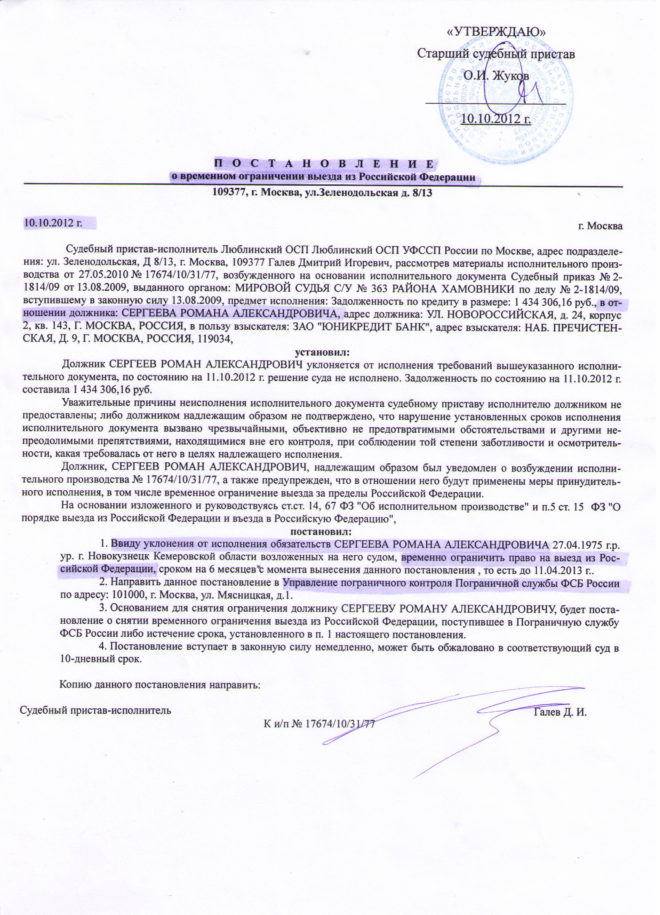
Customer Reviews
Gratitude from Ivanov I express my gratitude to Vasily Anatolyevich for the correct and competent legal assistance in solving my case. I wish you and your entire company prosperity and success.
With all my heart, V.V. Ivanov. 05/10/2018
Gratitude from Remedova A.G. I express my gratitude to the Legal Agency of St. Petersburg, namely Denis Yuryevich Stepanov, for the assistance provided in resolving my issue, and I also express my gratitude to the entire team of the consumer rights protection society for their responsiveness and pleasant communication.
Remedova A.G. 08/17/2018
Review by Egorova A.N. I, Egorova Antonina Nikolaevna, am very pleased with the consultation of Yuri Vladimirovich Sukhovarov. Thank you for your attentiveness and understanding. I wish you further professional growth.
Gratitude from Natalya Gurova I would like to express my gratitude for the qualified and friendly advice from legal practitioner Daria Igorevna Zaprudnaya, Vasily Anatolyevich Kavalyauskas and Daria Valentinovna Kutuzova. The environment at the law firm is welcoming and professional. I wish you continued prosperity. Thank you for your help.
Best regards, Natalia Gurova. 07/06/2018
Gratitude from Matvey Fomin I, Matvey Alekseevich Fomin, am grateful to Vasily Anatolyevich Kavalyauskas for the timely legal advice and prompt assistance in resolving my issue. Calm and decisive. Thank you.
Fomin M.A.
Gratitude from Alexey Shubakov Many thanks to Sergei Vyacheslavovich for the complete and detailed consultation. I have not encountered legal assistance before, but now, with a very favorable impression, I will definitely apply again in the future.
Shubakov Alexey 10/17/2018
Gratitude from A.P. Sovenova and E.Ya. Komudina Dear lawyers!
Please accept our deep gratitude for your attention, professional approach and desire to help people. We especially want to highlight Dmitry Germanovich, Denis Yuryevich, Daria Valentinovna.
Best regards, A.P. Sovenov, E.Ya. Komudina
Gratitude to Kavalyauskas V.A. from Astafieva A.S. I express my gratitude to the Legal Agency and in particular to lawyer Vasily Anatolyevich Kavaliauskas for the skillfully done work. Vasily Anatolyevich advised and prepared all the documents necessary for court proceedings. As a result of the consideration of the consumer rights case, the result and the high amount exceeded all my expectations. Thank you very much for your qualified work and professionalism.
Sincerely, Astafieva A.S., 03/01/2019
Gratitude from N.A. Uvarova I express my deep gratitude to lawyer Sergei Vyacheslavovich for his attitude towards me and my question. There are no words to describe the feelings of gratitude for the professionalism shown and the greatest human sympathy and understanding! All the best to you! Health, success in work and long life!
Thank you very much! Sincerely, Nadezhda Anatolyevna Uvarova, 07/25/2019
Gratitude to Pavlyuchenko I express my gratitude to Alexander Viktorovich Pavlyuchenko for the qualified management of my case, competent advice and informed decisions, which led to compensation for all claimed losses.
Best regards, Evgeny Nevinchany
How long is the travel restriction in effect?
Let us immediately draw your attention to the fact that the validity period of the restriction on traveling abroad for each of the grounds will differ. For example, for FSB employees and conscript soldiers, the restriction applies during the period of their service, for those admitted to state secrets - for 5 years from the date of the last acquaintance with secret papers.
Since travel restrictions are most often associated with debts, let’s consider the period of its validity. In general, the length of the ban on traveling abroad is regulated by clause 5 of Art. 15 Federal Law No. 114 - until obligations are fulfilled (that is, debt is repaid) or an agreement is reached between the debtor and the collector.
As the FSSP explains, the period of travel ban for debtors is determined by the bailiff; it cannot exceed 6 months. After six months, even if the debt has not been repaid, this restriction is canceled - to extend it, the bailiff must issue a new resolution.
If, by virtue of the requirements of Art. 18 Federal Law No. 114, a citizen’s international passport was previously confiscated; when the restriction is lifted, the document is returned by the migration authorities to the owner.
How to travel abroad with debt
There is a unique way that allows you to travel abroad while in debt. It is connected with the geographical location of the Russian Federation: in order to travel to Kaliningrad, you must pass through Belarus and Lithuania.
Every citizen of the Russian Federation, even theoretically, having debts, can travel to Kaliningrad. If you board a plane, that’s where it will land. If a Russian takes a train, he can get off not in Kaliningrad, but in Lithuania, or more specifically, in Vilnius.
The algorithm of actions looks like this:
- The Russian must have a foreign passport with a valid Schengen visa. It is best to take care of issuing a Schengen multiple entry visa in advance.
- Take a ticket from Moscow to Nesterov, Chernyakhovka, or Gusev. The price in all directions will be the same. When purchasing, you should refuse the UTD (universal travel document). Tickets can only be purchased at the Russian Railways ticket office.
- Get to Vilnius (having a Schengen visa gives a Russian this opportunity). Lithuanian border guards are not aware that the Russian has problems with debts. Having seen a Schengen visa in the passport, they freely let him into the country.
It is not necessary to return to Russia via Vilnius.
From Europe you can take a ticket directly to Moscow. Upon returning, the Russian may face questions from border guards regarding the ban on traveling abroad.
The Russian should answer that he did not use the above method on purpose. It is also advisable to say that the traveler was not aware of the ban, and chose this route because the connection through Vilnius was very convenient for him. By answering this way, you can avoid unpleasant consequences.
This option may become irrelevant over time.
How to find out if there are travel restrictions
Information about the ban on traveling abroad must be conveyed to the citizen. For this purpose, the bailiff, guided by clause 10 of Art. 67 Federal Law No. 229, sends a copy of the resolution to the debtor no later than the next day. However, if the debtor does not live at the address indicated in the executive documents, he may not know about the existence of such a prohibition. In order not to receive unpleasant news when passing border control, it is recommended to check for prohibitions before traveling:
- verified website “Nevylet.RF”;
- using the FSSP Enforcement Proceedings Data Bank, where you can find information about open proceedings, the amount of debt and contacts of the bailiff who is handling the case and will inform you about the existence of a restriction;
- by contacting the FSSP unit at your place of residence;
- using special Internet services that, for an additional fee, will provide the necessary information within a few minutes.
How to remove the restriction
There are several reasons why the restriction on traveling abroad should be lifted:
- Debt repayment. In this case, the bailiff is obliged to issue a resolution to lift the restriction no later than the next day after receiving information about the payment of the debt.
- Termination or termination of enforcement proceedings. In accordance with paragraph 1 of Art. 44, paragraph 4, art. 47 Federal Law No. 229 in the event of termination (for example, after reconciliation between the debtor and the claimant, invalidation of the writ of execution, etc.) or completion (for example, if it is impossible to establish the whereabouts of the debtor or his lack of liquid property) of the proceedings, the ban must be lifted. If the enforcement proceedings are terminated, they will be released abroad without any problems.
- Appeal against the decision. For example, if the conditions for its imposition are not met (the amount, terms, etc. do not correspond). In addition, a complaint can be submitted to the leadership of the FSSP - the chief bailiff - within 10 days after becoming aware of the violation.
For other methods, read the article “How to lift the ban on debtors traveling abroad.”
General information
There are situations when tourists go on vacation, successfully check in for a flight, but when going through passport control they learn that they are subject to restrictions on traveling abroad.
The reason is unpaid debts:
- loans from banks;
- debt for housing and communal services;
- tax avoidance;
- various fines;
- alimony;
- any other debt determined in court.
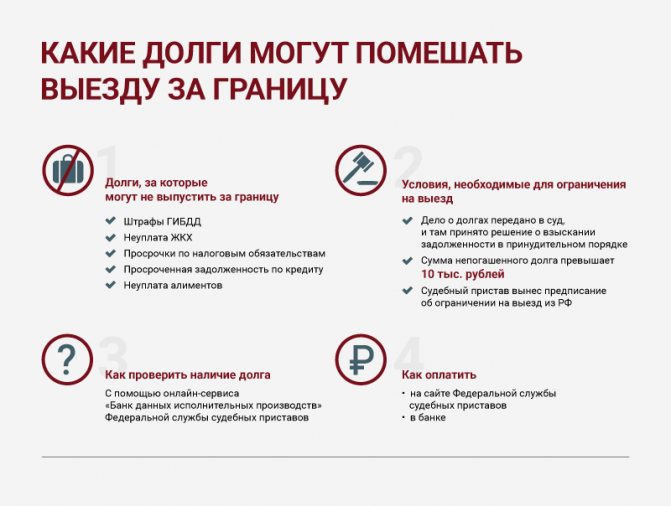
Is it possible to leave the country with debts?
As stated above, debt repayment is far from the only reason why the travel ban will be lifted in 2021. For example, in the event of an appeal against a bailiff’s decision as unlawful or termination/completion of enforcement proceedings without actual execution, the debt itself does not disappear. However, the ban on leaving the country is lifted.
In addition, there are other mechanisms for leaving with debts. For example, in accordance with FSSP Letter No. 12/01-18554-AP dated 08/01/2012, it is possible to cancel the temporary restriction on travel in the event of:
- the need for emergency treatment of the debtor outside the Russian Federation (if treatment is impossible in Russia);
- the need to accompany a relative who needs urgent treatment, or the death of a loved one living abroad.
To do this, a petition is submitted with justification and documentary evidence of the specified reasons. Read more about this in the article “How to travel abroad with debts.”
FAQ
Above we discussed questions that readers may have. If some remain unexplained, ask them in the comments or look for the answer to them in this section.
Can a bank prohibit travel abroad without a court hearing?
The law establishes a clear procedure for introducing restrictions. The bank cannot prohibit travel abroad without a court, since it is not vested with such powers. To introduce this ban, a financial organization must first file a lawsuit to collect the debt, then submit a writ of execution to the FSSP. And only after the commencement of proceedings and the expiration of the period for voluntary execution can the bank apply for the introduction of a restriction for the debtor. Without going through all these stages, traveling abroad is not prohibited.
Who imposes a ban on traveling abroad?
Both the judicial authorities and the post-trial authority impose restrictions on travel within the framework of their powers. So, bailiffs do this if they have judicial acts or executive documents issued on their basis. Only a court can prohibit departure, therefore, if enforcement documents were issued by other competent authorities, the bailiff additionally applies to the court.
How to restrict a debtor’s travel abroad if he owes me a lot
In this case, a travel ban may be imposed if:
- the amount of debt is above 30 thousand rubles (10 thousand rubles if it is alimony/compensation for harm or 2 months have passed since the expiration of the voluntary payment of the debt);
- there is a court decision on collection;
- Based on the court decision and the writ of execution, enforcement proceedings were opened.
If these conditions are met, all that is needed is to send a petition to the bailiff to restrict the debtor from leaving the country, if he has not already done so on his own initiative.
Can a police officer travel abroad?
A partial ban has been introduced for police officers - they can travel to a limited number of countries. You will find more useful information in the material “Can police officers travel abroad?”
Required documents for verification
Obtaining data using an online resource or in person by contacting bailiffs to provide documents is no different from each other. In both cases, checking the imposition of a ban on traveling abroad requires the use and provision of the following documents:
- application in the prescribed form;
- passport details;
- TIN;
- SNILS.
They are the main ones for presentation when resolving the issue of debts, as well as in the case of filling out electronically on the website of the bailiff service.



